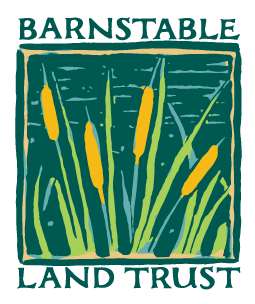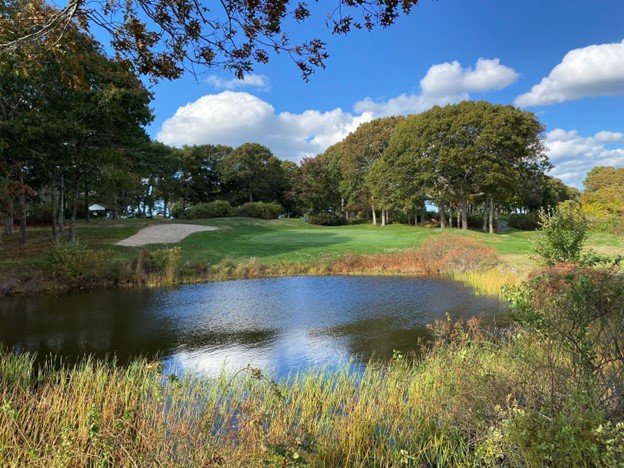On a Cape Cod golf course, the region’s housing crisis comes to a head
By Andrew Brinker, Globe Correspondent
Janet Milkman, executive director of the Barnstable Land Trust, is pictured on a footbridge crossing a small pond on the sixth green of the Twin Brooks Golf Course in Hyannis.BARRY CHIN/GLOBE STAFF
BARNSTABLE — A sense of peace permeates the air here, in the wind that swirls over shaded greens, through the brilliant orange leaves that line the fairways, and under the wings of the shorebirds coasting overhead.
Janet Milkman pauses atop a grassy ridge to take it all in, then sighs and shakes her head. “Why,” she says, “would anyone want to develop this?”
It is indeed tranquil as Milkman walks the grounds of the Twin Brooks Golf Course — 40 acres of greens and fairways in Hyannis about a mile from the Atlantic Ocean — on a pleasant autumn day. But a bitter fight rages here too, over what will become of the place, and, some say, over the future of Cape Cod’s economy.
Despite its charm and prime location, Twin Brooks, built in the 1960s, has long struggled to attract patrons due to its short layout, and two years ago a national housing developer, Quarterra, agreed to buy the place from the real estate firm that has owned it since 2007. (Quarterra declined to say how much it’ll pay.)
Quarterra plans to build 312 apartments on the property across 13 residential buildings. QUARTERRA
‘We are losing the Cape we have always loved’: Soaring home prices put the pinch on longtime rentersWant to buy a house on Cape Cod? Better hurry!On Cape Cod, a band of mobile home owners fight for their park: ‘The vultures want it! But they’re not going to get it.’
It plans to erect 13 buildings holding 312 apartments. It’s the sort of higher-density development that housing advocates say the Cape desperately needs to confront its acute housing shortage, which is squeezing out the workforce that sustains the region’s economy at an alarming pace. Already, 48 percent of the region’s workforce commutes in over the bridges linking the Cape to the mainland.
But pushback from the community against the development has been powerful, and it is still swelling as it inches closer to approval. Some local leaders groups want the town or a combination of public and private interests to purchase the property and preserve it as a massive swath of open space, a “Central Park for Cape Cod.” There’s been talk of a lawsuit if the project moves forward.
It is a familiar story in a place where residents often bristle at the mention of large residential complexes.
Should apartments sprout here, they would represent a significant break from the Cape’s historical development pattern, which has centered heavily around single-family homes. Over the last decade, the region has permitted four single-family houses for every multifamily unit approved.
At the same time they’d serve a deep and growing need. A recent report by real estate analysis firm The Concord Group estimates that more than 800 families earning less than $100,000 annually will leave Cape Cod each year through 2026 due to a lack of housing in their income range. The region’s rental housing stock is 99 percent occupied, the report found, and it is shrinking.
Regardless of outcome, the uphill battle toward approval could well take at least another year, or lead to an even-more-bitter fight if developers force the issue with a 40B appeal, a state statute designed to encourage construction of affordable housing in communities that lack it. And the intensity of the struggle offers a case study in why even communities facing the worst of the state’s housing crisis still struggle to produce more units.
“We are at a critical point,” said Paul Niedzwiecki, CEO of the Cape Cod Chamber of Commerce. “People — and not just advocates, but our residents — need to start asking themselves, ‘If we don’t develop here, where will we do it? And if some kind of change to the way we view development doesn’t happen now, when? This isn’t about one apartment complex, it’s about the sustained economic vitality of our region.”
It’s easy to understand why some residents want to preserve this place. Framed by two trickling creeks and a thicket of trees, the course is a picturesque swath of green a short walk from Main Street.
Save Twin Brooks, the resident group at the forefront of the opposition, describes it as much more than a golf course; it is, residents say, “an urban wildlife sanctuary” home to dozens of species of birds and mammals alongside protected wetlands. They argue that the proposed development would destroy habitats, contaminate the creeks, and encroach on the wetlands.
The Twin Brooks Golf Course in Hyannis. ANDREW BRINKER
“We are talking about nothing short of an environmental disaster should these apartments be built,” said John Ale, a retired lawyer representing the resident group. “I understand the desire for housing, but that shouldn’t come at the expense of a beautiful property like this.”
Building on Cape Cod is often thorny. It’s estimated that more than 80 percent of the region’s land is either already developed or under conservation restriction, so environmental concerns around any large-scale project are practically a given.
But in the case of Twin Brooks, proponents and some environmentalists dispute claims that the site is particularly sensitive, and despite its beauty, they say its environmental value is limited. A report published last year by two leading local advocacy groups listed Twin Brooks as one of the best locations in Barnstable for housing development.
That’s because municipal agencies on the Cape consider golf courses to be developed land that is tainted by years of chemical grass treatment and careful landscaping, making new development on those plots minimally harmful, perhaps even generating less carbon runoff. And Twin Brooks, unlike most of the Cape, has access to the municipal sewer system, meaning issues with pollution would be inherently limited compared with other properties that don’t have the same luxury.
If built, the complex would be one of the largest new residential developments on Cape Cod in recent years, partly because some multifamily developers steer clear of the region knowing the likelihood of bitter, almost reflexive, opposition, said Rob Brennan, managing partner of the development firm CapeBuilt and an attorney representing large, multifamily projects on the Cape.
“Developers should be scrutinized and should have to listen to the community,” he said. “But on the Cape, I think people get particularly riled up. A lot of the time, what that means is that the approval process can get dragged out for years.”
The creeks that frame Twin Brooks feed into the Stewart's Creek Estuary, pictured here. BARRY CHIN/GLOBE STAFF
Single-family home building has far outpaced multifamily development in Barnstable County over the last four decades. Today, single-family homes account for more than 80 percent of the Cape’s total housing stock, compared with 52 percent statewide.
That kind of development, some local leaders argue, is far worse for the environment than building larger, denser apartment buildings designed to coexist with open space. Widespread single-family building is akin to “death by 1,000 cuts,” said Niedzwiecki, the chamber of commerce CEO.
“We’ve seen what the existing development pattern gets us on the Cape: It gets us, on a very broad scale, a fragmented landscape, lousy water quality, high volumes of traffic, and reduced open space,” said Andrew Gottlieb, executive director of the Association to Preserve Cape Cod, the environmental group that helped create the development report. “I have some minor concerns about Twin Brooks, but they pale in comparison to my concern with the way our region is looking at development overall.”
Milkman, the executive director of the Barnstable Land Trust, a group that works to preserve environmentally valuable parcels of land on the Cape, said residents’ concerns go well beyond the environment. Some are worried the complex will worsen traffic problems at a nearby rotary; others characterize the golf course as the last remaining green space near downtown Hyannis.
Regardless of motivation, they are willing to fight.
Milkman’s group proposed an alternative plan that would cut the number of apartments in half, while devoting part of the property to open space. And in public meetings, residents have appealed to the Cape Cod Commission — a regional regulatory body that must approve the project — to block it. Save Twin Brooks is readying a lawsuit, should the project move forward.
The banks of the Stewart's Creek Estuary are lined with phragmites, an invasive reed species that grows in wetland areas. BARRY CHIN/GLOBE STAFF
Dan Lee, the head of Quarterra’s New England division, said the developer has participated in repeated public meetings and made a number of changes to plans based on community feedback, increasing the number of income-restricted units, for instance, and moving one building further from wetlands.
Ale, the Save Twin Brooks representative who has a second home in Hyannis, said those concessions do not address what he described as a dearth of open space in the town. He wants the sale called off, and for community stakeholders to find a way to purchase the course, though he admits it would be challenging to gather the funding. And he suggested that projects like the Twin Brooks proposal aren’t needed to address the Cape’s housing shortage.
“In a lot of cases, people move to Cape Cod to buy a house. They’re not looking for a small apartment like what would be built here,” he said. “And we have hundreds of new housing units that have been recently permitted across the Cape.”
But by a number of measures, there’s an urgent need for more, said Alisa Magnotta, CEO of the Housing Assistance Corporation, the lead housing advocacy group on the Cape, and few places to build it at the scale of Twin Brooks. She paints the debate in almost existential terms.
“People are beating up the Twin Brooks project, but these are people that either don’t have to think about our housing crisis, or haven’t looked at the broader picture,” she said. “If we can’t house our workers, that’s it. Our society dies. Our community dies.”





